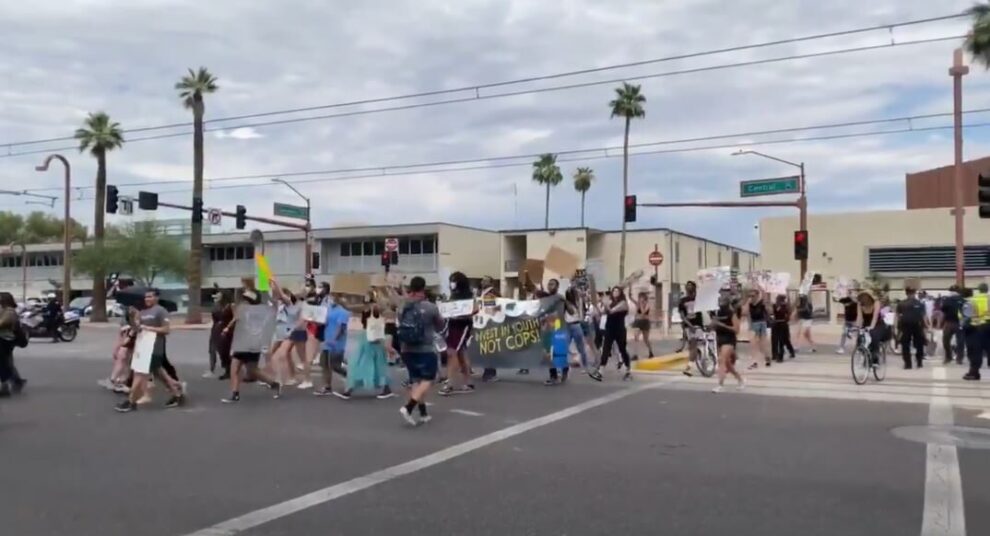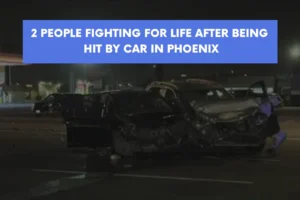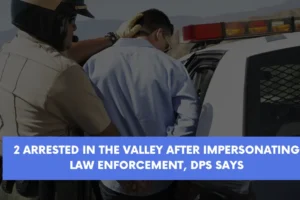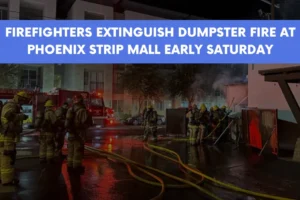Arizona schools are taking action to ensure schools are equitable, safe places for students of color following recent protests for justice and police reform after George Floyd, an unarmed Black man, died May 25th after a white Minneapolis Police Officer knelt on his neck for more than eight minutes.
That same day, Dion Johnson, an unarmed Black man, was fatally shot by an Arizona Department of Public Safety officer after he was found asleep in the driver’s seat of a vehicle stopped on Loop 101. Protests began in Phoenix on Thursday, May 28th and have continued each evening since then.
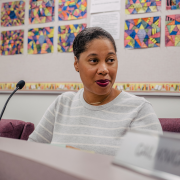
Channel Powe
Last night, Balsz School District Governing Board unanimously approved a resolution to address systemic racism towards Black students and pledged to continue to prioritize and target Black students’ academic achievement, said Channel Powe, board president of the Phoenix school district that serves more than 2,340 students, who are predominantly Latino and Black with many from immigrant, refugee, homeless and other marginalized communities.
“To this end, Board members in collaboration with the community will identify high need issues and shall reconvene with the Superintendent in [30] days to begin to effectively address the issues by using the tools, systems, resources and talent that exist within our district and community and equitably investing resources for our students and their families to achieve marked and measurable improvements for Black students within Balsz Elementary School District over the next year,” the resolution states.
Earlier, Balsz Incoming Supt. Dr. Arleen Kennedy and Board President Powe sent a message to students families, staff members and community members providing them with information to cope with systemic racial inequities exacerbated by the COVID-19 pandemic and the deaths of unarmed African-Americans and letting them know that staff members would be reaching out to check in with students and their families to let them know they’re thinking about them.

Dr. Arleen Kennedy
They also talked about their efforts to support staff’s cultural competency with resources such as The Brown Bookshelf and Common Sense Media’s books to begin and support conversations about racial equity. Then they provided parents with resources on how to talk with their children about racism such as Good Morning America’s video: “How parents can talk to kids about racism, George Floyd Protests” and Coming Together: Standing Up to Racism: A CNN/Sesame Street Town Hall for Kids & Families.
“We are committing to creating a diverse, culturally competent pool of educators who will perform the services necessary for both teaching and support for students to overcome trauma,” Powe said.
In addition, Black Lives Matter’s curriculum committee has put together a 2020 Curriculum Guide with free, downloadable lessons for every grade level that challenge racism and oppression and help build happy and healthy classrooms.
Basing investigations on justice-centered phenomena can be a powerful and rightful way to support science and engineering learning. #NGSSChat #SciEdhttps://t.co/CQgqp87hEB pic.twitter.com/B4FxZPjqFW
— STEM Teaching Tools (@STEMTeachTools) June 2, 2020
“We as educators should use data as a guiding light for areas of growth and improvement to ensure equitable outcomes. This has to include ‘courageous conversations’ that seeks to heal from past traumatic experiences,” Dr. Kennedy said.
— Arizona PTA (@arizonapta) June 4, 2020
Racism and inequity continue to linger for too many people in too many communities, said Dr. Sheila Harrison-Williams, executive director of Arizona School Boards Association.
A message from ASBA Executive Director, Dr. Sheila Harrison-Williams
“But it doesn’t have to. And, it shouldn’t. As public education leaders, we have an opportunity and a responsibility to make sure it doesn’t any longer,” Dr. Harrison-Williams said.
“We need to ensure that our students feel safe, supported and valued in our schools. That they see us – on their behalf – fanning the flames of hope and promise and access – of respect, and of civility,” Dr. Harrison-Williams said.
“The onus is on us to be the change for this generation and future generations.
#BlackLivesMatter pic.twitter.com/JjZjhAZx4B
— Kathy Hoffman (@Supt_Hoffman) June 2, 2020
The superintendents of 12 Phoenix-area schools created and signed “Our Commitment to the Society Our Children Deserve,” which states that “Violence toward African American boys and girls, men and women, is a scourge that plagues our nation. Communities of color are threatened today as they have been throughout our nation’s history.”
The superintendents commit to make school “the safe place within the community our children can count on” by continuing to provide professional development about social-emotional learning for adults and children alike, examining implicit bias and taking steps to reduce these biases, examining persistent racial gaps in educational attainment in their systems, using data to eradicate disproportionality in student discipline, providing equity in education and examining equity gaps as part of their strategic plans for success.
Everyone must speak out against racism, because silence only contributes to the problem, said Daniel A. Domenech, executive director of AASA, The School Superintendents Association.
“Now is the time for all educational leaders to intensify our commitment to address inequities and work to dismantle systemic racism,” Domenech said. “This can be done by working to effectively implement curriculum that is diverse and culturally sensitive.”
“In a #racist society, it is not enough to be #nonracist, we must be #antiracist.” – #AngelaDavis
— Community Foundation for Southern Arizona (@SoAZCommunityFd) June 9, 2020
“These strategies must also include a renewed focus on an anti-racist curriculum in our history lessons, so that children are educated, informed and able to learn from our shared history,” Domenech said.
What other schools and advocates are doing
Schools and education advocates nationwide are taking action.
Change starts with each one of us. We simply must be better. We must demand better.
Expect More Arizona respects and values the diverse perspectives that represent education in our state, but we can do more to live up to this core value. pic.twitter.com/7xFp8R9bMJ
— ExpectMoreAZ (@ExpectMoreAZ) June 3, 2020
Highline Public Schools Board of Directors released a message to families in Burien, Wash., where 77 percent of pupils are students of color, that they will “lean into the challenge and priority to be an anti-racist institution, understanding that this will be a key lever in eliminating opportunity and achievements gaps.”
Their message reads, “As we have viewed and heard, Mr. Floyd spent his final moments pleading for his life as an officer held him down and unlawfully pinned him to the ground with his knee. His last words were, ‘I can’t breathe.’
Police Shootings Lower Black and Latino Students’ Grades, Graduation Rates, Study Shows https://t.co/29HzPGOnK7 pic.twitter.com/bfeZNQcxRp
— Education Week (@educationweek) June 10, 2020
“We are saddened by this loss and deeply disturbed as it continues to reflect the tragic outcomes and impacts of fear, hatred, and systemic and structural racism within institutions. This includes our school district. We have students past and present who have been gasping to breathe in our system, yet oftentimes pinned down and pushed out by beliefs, behaviors, inability, apathy, and blatant avoidance. To echo and underscore Superintendent Enfield’s conviction and commitment, this changes today.
“As a board, we have the privilege and responsibility to govern policy, support the superintendent, and hold the system accountable to educate all students. We have an equity policy that explicitly calls us to be an anti-racist organization. We are committed to understanding and delivering on supports that are needed and reviewing/revising measures of accountability.”
“‘Achievement gap’ is a terrible term,” said Jon Valant of the Brookings Institution, who was not involved with the study but who also researches the effects of education rhetoric. https://t.co/xUwnv7u6wx
— Education Week (@educationweek) June 4, 2020
Tucson Unified School District Supt. Dr. Gabriel Trujillo said in a statement that “As a community and a public school district, we understand and embrace our role in dismantling structures of inequity, systemic discrimination, and racism in our society,”
Tucson Unified serves more than 45,500 pupils and more than 60 percent are students of color.
“This commitment is exemplified daily through the exceptional work of our African American, Mexican American, Native American, and Asian Pacific Refugee Student Services Departments and our commitment to culturally responsive practices throughout our district,” Dr. Trujillo said.
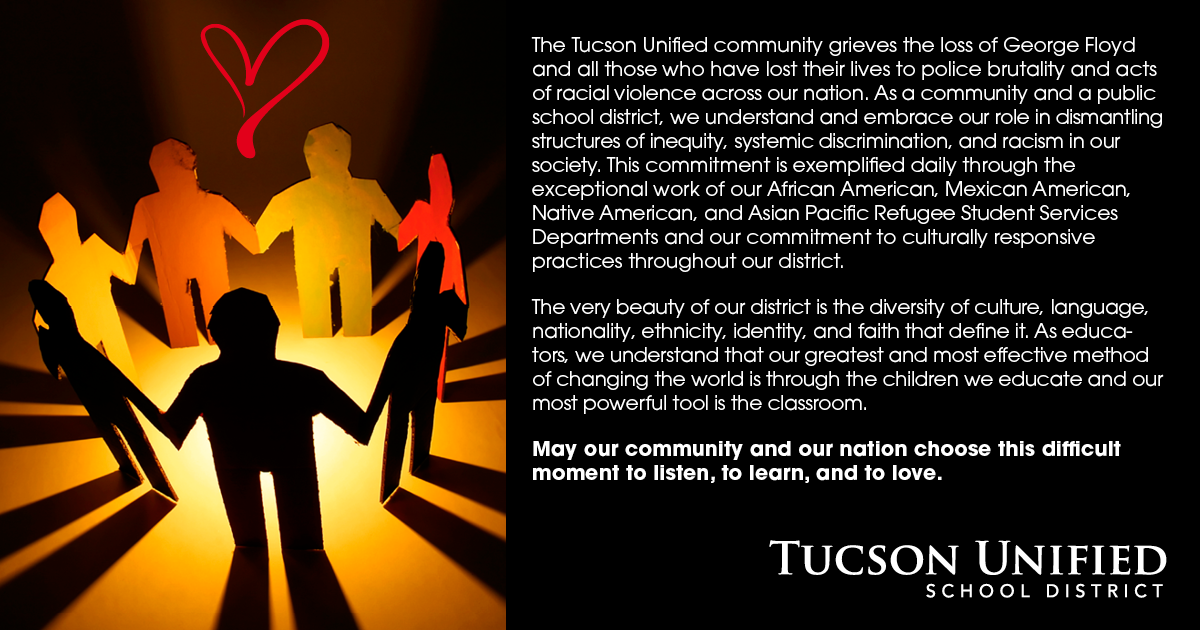
Tucson Unified has a strong anti-bullying program and multicultural curriculum, which is inclusive of the histories, cultures, and contributions of diverse groups of people, enriches learning for all students, and prepares them to work toward structural equality and equity by engaging in critical thinking around issues of racism, sexism, classism, linguicism, ageism, genderism and more, said Leslie Lenhart, senior communications and brand marketing leader for the district.
“The significance of multicultural education is that it gives individuals the opportunity to examine their own social and cultural biases, break down those biases, while giving them a broader view of the world,” Lenhart said. “This is one of the most effective ways to strengthen intergroup relations.”
This school year, Tucson Unified offered nearly 400 sections of culturally relevant courses to nearly 9,000 students, and all teachers and administrators have received ongoing culturally responsive and restorative practices training since 2017, Lenhart said.
Tucson Unified also hosts The Summer Institute for Culturally Responsive Education each year, a three-days workshop on the exploration of anti-racist approaches and theories in education, Lenhart said.
In addition, Tucson Unified held a Zoom forum on Race Relations on June 4 led by several district leaders and open to the public. The 300 participants took part in breakout sessions to discuss several key questions relating to racial challenges and the development of possible solutions, Lenhart said.
“This forum was only the beginning of a series for this critical discussion and healing in our community,” Lenhart said.
Tucson Unified Governing Board President Kristel Foster said in a statement “We must come together and use this moment for our transformation.”
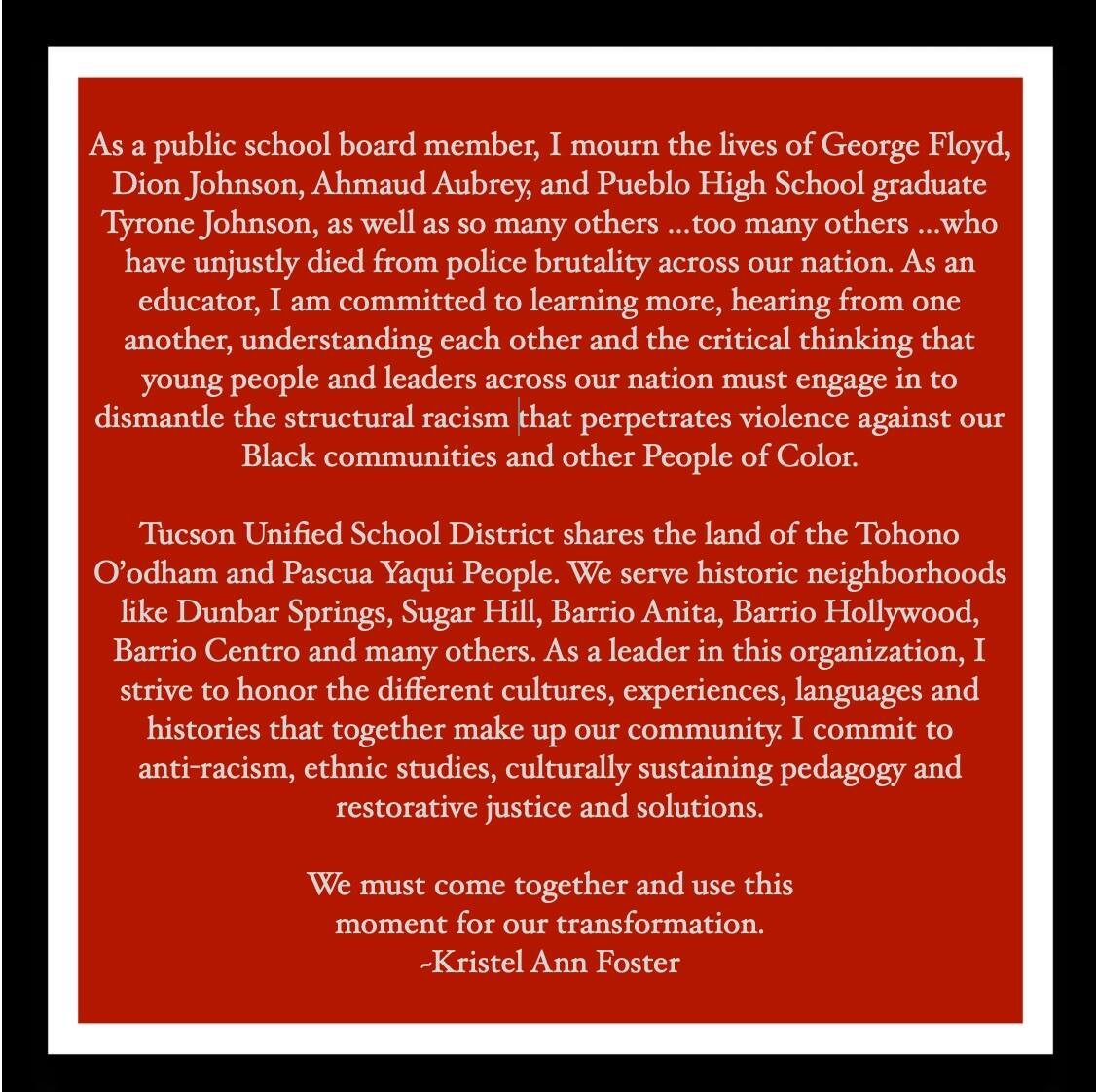
Sunnyside Unified School District’s Governing Board said in a statement “As a learning community that is centered on equity, we must call out the acts of injustice that continue to occur in communities of color across this nation. We stand in solidarity against racism and violence against black communities.”
Dysart Unified Supt. Dr. Quinn Kellis said in a video he is “humbled by so many examples of courageous people doing extraordinary things to right the wrongs in our society; who advocate for, and who protect, our human rights; who open previously closed doors for civil discourse; and most of all, who ensure each and every individual can reap the full rewards of their education, hard work and talents.”
Dysart Unified School District Video: A message of peace, respect and harmony for the Dysart community
Dr. Kellis said Dysart is “committed to providing a safe, welcoming and inclusive environment for learning and working,” and he encouraged people to contact him with their ideas on ways the district can do it better.
Crane Elementary School District is committed to providing a safe, respectful and equitable learning environment for our students, staff & community. During this time of unrest in the country – and always – we stick together. #WeStickTogether #WeAreCrane https://t.co/kbqU9jg5aQ
— Crane School Dist. (@CraneSchools) June 5, 2020
Peoria Unified School District Supt. Linda Palles Thompson said in a message that “It goes without question, yet needs to be said, that we stand in support of our black community, for that matter, all of our under-served and under-represented students, staff and community members.”
“We recognize the importance of inclusion of diverse ideas and beliefs in furthering the mission of public education,” Palles Thompson said. “We look forward to growing as listeners, engaging with you to solve problems and making the necessary improvements that lead all of us to future success.”
Palles Thompsons said she hopes all community members “will join us as we do our part to move this conversation forward in the coming year.”
She encouraged staff experiencing pain from what they see playing out across the country to reach out to the district at 623-486-6000 and students to call the Student Support Line at 623-412-5262.
A few years ago, Peoria Unified launched a Diversity and Inclusion Team to improve schools and the communities they serve through celebrating and promoting diversity, awareness and inclusive practices. “This team will be working to prepare for the start of the new year in a way that is mindful of the social and emotional needs of our students and staff, as a result of our current environment,” Airey said.
Schools consider whether police should be on campus
As part of that process, Minneapolis Public Schools Board of Education terminated its contract for school resource officers with the Minneapolis Police Department eight days after Floyd’s death, prompting other schools across the nation to consider doing so as well.
Do cops belong in schools? https://t.co/Xy0oHaiCW7 #tellEWA
— Politics K-12 (@PoliticsK12) June 10, 2020
“George Floyd died on the street slowly and deliberately strangled and our children watched,” Jenny Arenson, vice chair of the board said during the virtual meeting on Tuesday. “Minneapolis police, individual officers and the city have work to do. And until they demonstrate they have done that work, we need to separate our relationship.”
Hundreds of Phoenix Union High School District students held a protest on Friday, June 5, to demand that the contract between the district and the Phoenix Police Department be terminated. The central Phoenix district serves more than 27,420 students, who are predominantly Latino and Black.
Following a Minneapolis school district’s decision to end its contract with the police department for on-campus officers, students are pressuring Phoenix Union High School District’s governing board to do the same. https://t.co/H1M9jyjjy4
— azcentral (@azcentral) June 4, 2020
“We feel that by having police in our schools, it sends a message that black and brown students are criminalized before they even leave our school systems,” said Jasper Smith, a recent graduate of Betty Fairfax High School and one of the protest’s organizers in an interview with The Arizona Republic. “School is for education, not for criminalizing.”
pic.twitter.com/M1ztgP41zu
— Chelsea Hofmann (@chofmann528) June 5, 2020
Phoenix Union Governing Board Member Stephanie Parra said May 31st that the board would postpone it’s vote on the contract, and Supt. Dr. Chad Gestson said at a recent board meeting that he wanted to listen to more community members before making a decision.
For the past two years, students with March for Our Lives AZ have asked for funding more counselors on campus instead of school resource officers. Arizona Legislators and Gov. Doug Ducey have increased funding through grants, letting schools decide between counselors or SROs.
Balsz School District “does not currently and does not intend to have a school resource officer,” according to a joint statement by Incoming Supt. Arleen Kennedy and Board President Channel Powe.
Tucson Unified has several schools with school resource officers, and “they are an integral and valuable part of the school team. The Students and staff have a positive relationship with them and they participate in many school and district events,” Lenhart said.
Peoria Unified has “seven outstanding school resource officers and have seen an outpouring of support, love and appreciation for them,” said Danielle Airey, chief communications officer for Peoria Unified School District.
A call for police reform
Arizona Legislative Democrats requested on June 2 a special legislative session to address police reform after the deaths of George Floyd and Dion Johnson in police custody.
This afternoon my colleagues and I called for a special session immediately to address police reform issues: Some policies include 1) body cams on all officers 2) external investigations in OIS 3) LEO database for complaints 4) More Training 5) Limit qualified immunity #azleg pic.twitter.com/gGGatJIdCJ
— Rep Reginald Bolding (@reginaldbolding) June 2, 2020
Among the reforms Democratic Legislators seek are body cameras for all police officers, outside investigations of officers’ deadly use-of-force, a statewide database of officers’ history of misconduct, police training on de-escalation and sensitivity by the Arizona Peace Officer Standards and Training Board and limits on officers’ qualified immunity against lawsuits.
‘The governor appreciates their thoughtfulness,’ a @dougducey spokesman said of the call for a special session dedicated to police reform. ‘We’ll be working with the legislature on any additional legislative action now that Sine Die has occurred.’ https://t.co/m1o5ON2GSC
— Maria Polletta🌵 (@mpolletta) June 2, 2020
The Phoenix City Council approved a $1.3 billion budget on June 8th that included nearly $3 million for a new police oversight office.
NEW: The Phoenix City Council approved a $1.3 billion annual general fund budget Monday that included nearly $3 million for a new police oversight office. https://t.co/HlW7I5lhdA
— azcentral (@azcentral) June 8, 2020
The 7-2 vote fully funded the civilian oversight that the newly created Office of Accountability and Transparency will provide.
Today, Phoenix City Council came together in the midst of one of the most important moments in our nation’s and city’s history with a bipartisan vote to fully fund civilian oversight of the Phoenix Police Department. Full statement: https://t.co/vrUWyKJAJU pic.twitter.com/gQMvz28di7
— Mayor Kate Gallego (@MayorGallego) June 8, 2020
Young people and students in Arizona’s classrooms have been at the heart of the past 15 days of peaceful protests in Arizona.
Text everybody you know to join you in exercising their constitutional right to protest. Send all your friends a link to register to vote at https://t.co/vhWl2PM2ly. And show up to vote in every election.
— Michelle Obama (@MichelleObama) June 7, 2020
Many are recent Arizona high school or college graduates putting their beliefs into action during the protests in an effort to bring about change.
President Barack Obama’s Commencement Speech | Dear Class Of 2020
Leaders are reminding these young people that these protests are the first step in a process that includes getting involved in creating solutions and voting in upcoming elections to support their causes and to have a say in the future of their communities.
Ultimately, it’s going to be up to a new generation of activists to shape strategies that best fit the times. But I want to highlight some basic lessons from past efforts that are worth remembering:
— Barack Obama (@BarackObama) June 1, 2020
2. The point of protest is to raise public awareness, to put a spotlight on injustice, and to make the powers that be uncomfortable. But eventually, we have to translate those aspirations into specific laws and institutional practices.
— Barack Obama (@BarackObama) June 1, 2020
4. So if we want to bring about real change, the choice isn’t between protest and politics––we have to do both. We have to mobilize to raise awareness, and we have to organize and cast our ballots to make sure that we elect candidates who will act on reform.
— Barack Obama (@BarackObama) June 1, 2020
5. The more specific we can make demands for criminal justice and police reform, the harder it will be for elected officials to just offer lip service to the cause and then fall back into business as usual once protests have gone away.
— Barack Obama (@BarackObama) June 1, 2020








